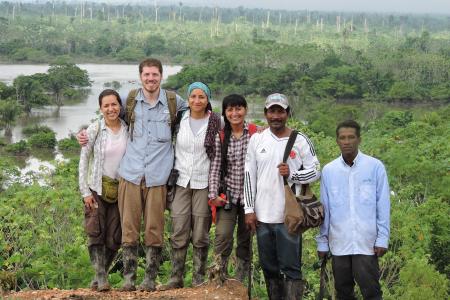
John Rossow and Yaribel Torres-Mendoza will begin a two-year, on-the-job training and service fellowship in epidemiology following their graduation in May. Both students are enrolled in a dual degree program that will see them graduate with a master’s degree in public health and a doctorate in veterinary medicine.
The degree program provided the flexibility for Rossow and Torres-Mendoza to gain meaningful public health experience while learning the foundations of infectious disease epidemiology.
“Veterinarians with public health training are uniquely equipped to address public health threats such as zoonotic infectious agents which affect both animals and humans, like influenza, West Nile virus and many other emerging diseases such as Zika and Ebola,” said Dr. Mary Hondalus, coordinator of the DVM-MPH dual degree program and associate professor in the College of Veterinary Medicine.
Commonly called the CDC’s ‘Disease Detectives,’ EIS officers are on the frontlines of disease response, supporting over 100 public health investigations in the U.S. and worldwide. The program is highly competitive, taking only 40 to 50 participants each year from a pool of over 800 applicants.
“The EIS is the premier training program in field epidemiology,” said Dr. Jose F. Cordero, who mentored Rossow and Torres in their master’s research.
Cordero is the Patel Distinguished Professor of Public Health and head of the department of epidemiology and biostatistics in public health. As a 27-year veteran of the CDC, he emphasized the resounding impact of EIS work.
“Former EIS officers are public health leaders at all levels, from global to local public health. Smallpox eradication, polio elimination and elimination of other vaccine preventable diseases, such as measles and rubella have been led by former EIS Officers,” he said .
.
Joining the ranks of the disease detectives is a “dream position” for Rossow.
“I know that the next two years with EIS will provide me with the hands-on training needed to apply my education from the dual degree program to mitigating and solving public health problems on a global scale,” he said. “To be accepted fresh out of university is a huge honor.”
Through UGA’s College of Public Health and the College of Veterinary Medicine, Rossow had the opportunity to travel to four countries to investigate public health problems, including a field assignment with a CDC team in Colombia where he worked to investigate Zika and neglected tropical diseases last summer.
Torres-Mendoza also took advantage of several opportunities to work abroad during her program, traveling to Brazil, Ethiopia, Indonesia and New Zealand.
“During my public health studies, I made an effort to learn different statistical programs, and with guidance of Dr. Cordero I did my MPH internship with the CDC’s dengue branch in Puerto Rico,” said Torres-Mendoza.
Both students credit their experiences on international projects with helping their applications stand out. Cordero agrees.
“The diverse set of experiences that UGA offered, such as internships at CDC and research field work on emerging diseases like Zika and others contributed to their success,” he said.
Joining EIS has been Torres-Mendoza’s goal for over a decade, ever since she participated in a CDC disease detective camp in high school where she realized she could combine her interested in veterinary medicine and epidemiology to prevent and control disease.
“One of the reasons EIS is so competitive is because very highly educated and experienced professionals apply,” said Torres-Mendoza. “EIS is a great opportunity at the start of my career, and I cannot wait to see where it will lead me.”
For more information about the Epidemic Intelligence Service, visit https://www.cdc.gov/eis/diseasedetectives.html.
